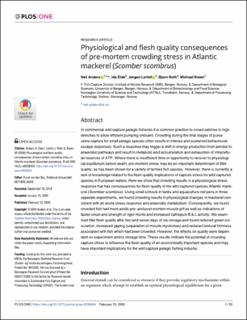Physiological and flesh quality consequences of pre-mortem crowding stress in Atlantic mackerel (Scomber scombrus)
Peer reviewed, Journal article
Published version
Permanent lenke
https://hdl.handle.net/11250/2684251Utgivelsesdato
2020Metadata
Vis full innførselSamlinger
- Articles [3011]
- Publikasjoner fra CRIStin [3061]
Sammendrag
In commercial wild capture pelagic fisheries it is common practice to crowd catches to high densities to allow efficient pumping onboard. Crowding during the final stages of purse seine capture for small pelagic species often results in intense and sustained behavioural escape responses. Such a response may trigger a shift in energy production from aerobic to anaerobic pathways and result in metabolic acid accumulation and exhaustion of intracellular reserves of ATP. Where there is insufficient time or opportunity to recover to physiological equilibrium before death, pre-mortem stress may be an important determinant of fillet quality, as has been shown for a variety of farmed fish species. However, there is currently a lack of knowledge related to the flesh quality implications of capture stress for wild captured species in European waters. Here we show that crowding results in a physiological stress response that has consequences for flesh quality in the wild captured species Atlantic mackerel (Scomber scombrus). Using small schools in tanks and aquaculture net pens in three separate experiments, we found crowding results in physiological changes in mackerel consistent with an acute stress response and anaerobic metabolism. Consequently, we found crowded fish had more acidic pre- and post-mortem muscle pH as well as indications of faster onset and strength of rigor mortis and increased cathepsin B & L activity. We examined fillet flesh quality after two and seven days of ice storage and found reduced green colouration, increased gaping (separation of muscle myotomes) and reduced textural firmness associated with fish which had been crowded. However, the effects on quality were dependant on experiment and/or storage time. These results indicate the potential of crowding capture stress to influence the flesh quality of an economically important species and may have important implications for the wild capture pelagic fishing industry.
